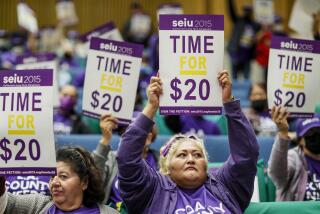Control of Growth Emerges as Long Beach Campaign Issue
The campaign literature is telling.
Councilwoman Jan Hall’s pamphlet emphasizes her experience. Mayor Ernie Kell’s flyer concentrates on what is positive in the city and his role in it.
And then there is the underdog, Luanne Pryor. Her mailers consistently hit hard on a string of issues--especially the threat of overdevelopment.
“Let me tell you why I’m running,” Pryor recently told a group of senior citizens. “You see, I feel we’ve lost a great, large chunk of Long Beach. And I feel we have to reclaim it.”
Since Pryor took to the streets with her message about controlling growth and the traffic and parking problems that come with added development, other candidates have picked up on what has become the underlying theme of the campaign.
Kell has taken pains to portray himself as “pro-neighborhood.” Hall is reemphasizing her long-standing commitment to protecting homeowners’ interests in her Belmont Shore district, a commitment she says she will take to the rest of the city if elected as mayor.
Still, in a city that is bustling with construction of new office buildings, hotels and apartments, none of the most visible candidates is talking about closing the door to development in the state’s fifth largest city.
Kell speaks with pride about the skyline that has been emerging during his tenure in City Hall, and he says the downtown has made “great strides.” In the neighborhoods, Kell continues, “we are addressing the change that comes with progress.”
Hall says she supports “managed growth . . . growth on our terms.” She emphasizes the need to anticipate and mitigate potential traffic problems. In downtown, she said, “we haven’t done that yet.”
“I think in the 3rd District we’ve done a very good job and it’s been a battle,” Hall says.
Pryor says she does not knock change. “I love quality development,” she says. But the city, Pryor says, is “not asking enough of developers.” Nor is it doing enough to conserve its heritage, she said, citing as one example the pending demolition of the historic Pacific Coast Club on Ocean Boulevard.
While still far behind Hall and Kell in her campaign endorsements and contributions, Pryor has attracted attention to her campaign with a clearly delineated array of issues. She has never held elective office in Long Beach, but Pryor comes to debates armed with statistics and specific points to be made. A fourth candidate, Bud Huber, is the only remaining candidate in the nine-person field who early in the campaign listed stands on a range of topics. But Huber, even more than Pryor, has little in the way of a campaign organization and lacks her lengthy list of civic activities.
Kell has been on the council for 13 years and Hall has been a member for 10, so both have the advantages of name recognition and experience in campaigning. As the only two office-holders in the race, however, they have also taken the brunt of criticism--particularly on whether the city is doing enough to safeguard against overdevelopment in residential neighborhoods.
“Long Beach neighborhoods are being destroyed by overdevelopment,” Pryor repeatedly says.
Hall responds that she has consistently worked to protect the interests of homeowners in her beach community district. One example she cites is the council’s vote in July, 1986, to set a height limit of two stories for dwellings in Naples and Belmont Shore. (That unanimous vote came after months of bitter debate, a city election that brought in new council members and a couple of vote switches by some of her colleagues.)
Both Hall and Kell argue that the council has been lowering the number of units allowed per lots--or downzoning--in neighborhoods throughout the city.
But Hall says the council has been too slow to downzone. The concerns of the neighborhoods should have been addressed sooner, Hall says. Instead, the council in the last few years has been dealing with “a crisis” and she blames “the current leadership”--referring to Kell--for not dealing with it sooner. Asked why she didn’t raise the issue of downzoning earlier herself, Hall said she has consistently “fought hard” for her own district, where she says measures have been taken to mitigate growth.
Kell says the city has done a good job and maybe could have downzoned quicker if the residents had brought their concerns before the council sooner.
Both Hall and Kell also point to the council’s decision in November, 1986, to approve a sweeping series of restrictions on apartment construction.
But that same vote is criticized by Pryor because the council rejected a city Planning Commission recommendation that the new rules be applied to 189 projects already submitted but without a city building permit. Pryor argues that the council’s split vote against making the regulations retroactive added another 2,000 units in box-like buildings to single-home neighborhoods.
Hall and Kell defend their vote by saying it would have been unfair to developers to change the rules after they had entered the planning process.
The debate over apartment construction is fueled by the biggest building boom in 30 years.
There were 2,316 apartment units built in the city between July, 1984, and July, 1985. In the 1985-86 fiscal year, the number rose to 3,423 and for 1986-87, it increased to 4,753 units, according to Dennis Eschen, city zoning administrator. In comparison, the average number of units built during the previous 30 years was between 1,300 and 1,400 per year, Eschen says.
About half of the construction has been in the 2nd Council District in south Long Beach, which is represented by Councilman Wallace Edgerton.
Downzoning the neighborhoods became one of Edgerton’s greatest concerns on the council. And he says he owes his awareness of the issue mostly to Pryor and her group, Beach Area Citizens Involved.
“Ernie Kell and Jan Hall will have their own issues. That’s Luanne Pryor’s issue. She’s helped teach me the issue,” says Edgerton, who says he is remaining neutral in the mayoral race. (He has donated $150 to Pryor’s campaign, says he is good friends with Kell and would not “do anything to hurt” Hall.)
“Luanne Pryor is making a difference” in the campaign, Edgerton says. Without her, “it would be a dull race.”
Pryor says Kell--and to a lesser degree Hall--has jumped on the bandwagon of a preservation theme for their own campaigns.
She also criticizes them for creating what she calls a “hotel culture” in a downtown she says is geared to tourists and not Long Beach residents.
Hall, Kell and Pryor agree that the city needs to bring in more theaters, shops and housing to downtown.
For his part, Kell concentrates on the positive when asked for the main issues in Long Beach. He points out, for example, that unemployment is 25% lower here than the state average, that crime went down last year and that tourism--”a clean industry”--increased by 50% from the previous year.
Hall, when asked last week, cited traffic as a central issue and called for more traffic enforcement. She said she has aggressively worked to implement in her district suggestions, such as the installation of new signals and left-hand turns, cited in a city transportation plan.
About a month ago, Hall also cited traffic as a problem but she said the city’s main issue was “hard to quantify. “This city is pretty spectacular,” she said. “People have chosen to stay in this city. Neighborhoods have stayed strong. . . . “
In another issue--control of the local airport--the three leading candidates find agreement in saying that the city should continue its battle to limit the number of commercial flights at the Long Beach Airport. Candidates Lou Robillard and Richard H. Hallowell also oppose airport growth. But Huber, Thomas (Ski) Demski, David E. Kaye and John J. Kearney disagree. Huber says the city’s court fight against the airlines is a waste of money, adding that Long Beach residents, business people and tourists need greater local airport service.
Pryor and Huber also are touting their support for campaign finance reform. Kell says he, too, supports placing a limit on the amount of campaign donations, but he has not supported any proposal that has come before the council. He says he has not yet seen a proposal he could support. Hall says she is against placing such caps because most proposals do not address in-kind contributions, such as volunteer time, and they hurt challengers with little name recognition who are facing an incumbent.
The candidates are split on whether the city should have a civilian police review board. The City Council recently rejected a proposal by the Public Safety Advisory Commission that its powers be expanded to include subpoena and investigatory powers, and--in essence--act as a civilian board overseeing the Police Department.
The National Assn. for the Advancement of Colored People, whose representatives allege blacks are subjected to racial slurs by local police, pushed for the review board--particularly in the wake of a five in-custody deaths last year. The police adamantly oppose the proposal and say there already are appropriate agencies reviewing police cases.
Huber and Pryor are alone among the mayoral candidates in favoring a police review board, while Demski said he doesn’t know enough about the issue to take a position.
More to Read
Start your day right
Sign up for Essential California for news, features and recommendations from the L.A. Times and beyond in your inbox six days a week.
You may occasionally receive promotional content from the Los Angeles Times.






